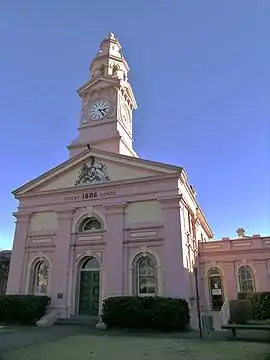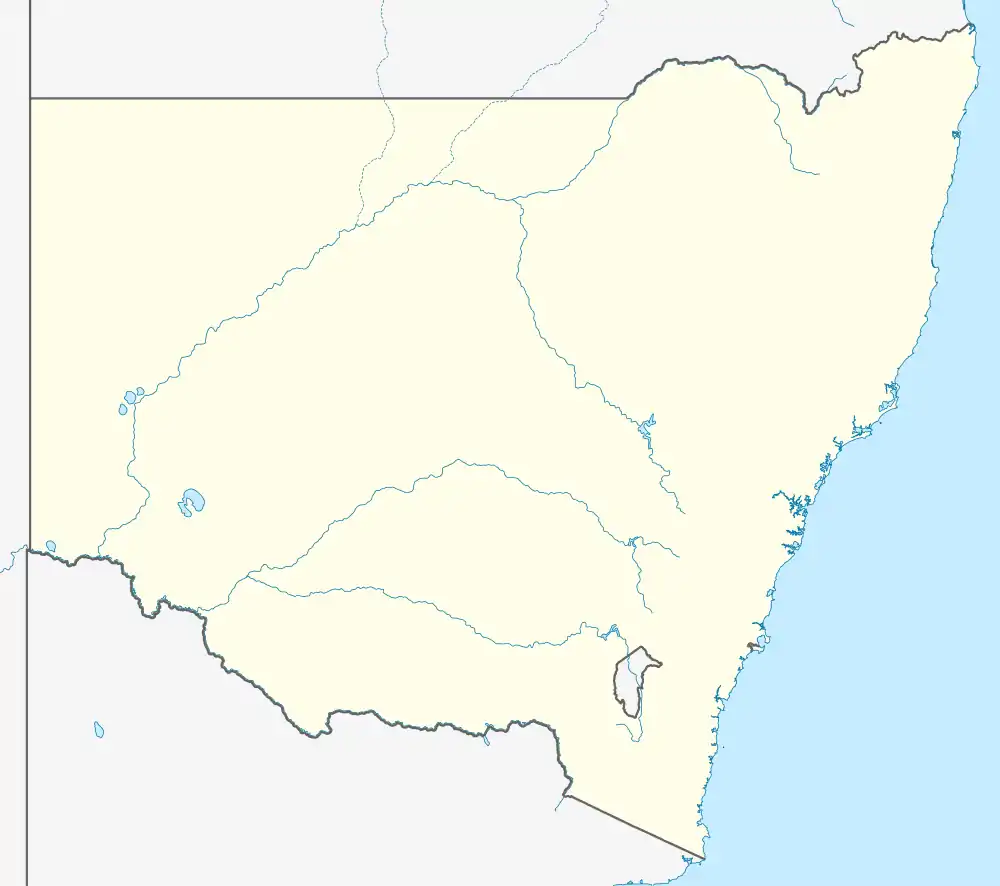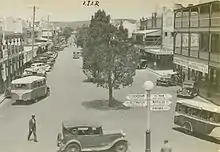Inverell
Inverell is a large town in northern New South Wales, Australia, situated on the Macintyre River, close to the Queensland border. It is also the centre of Inverell Shire. Inverell is located on the Gwydir Highway on the western slopes of the Northern Tablelands. It has a temperate climate. In the 2016 census, the population of Inverell was 11,660 and the Inverell Shire population was 16,483.[1]
| Inverell New South Wales | |||||||||
|---|---|---|---|---|---|---|---|---|---|
 Inverell Court House, built in 1886 | |||||||||
 Inverell | |||||||||
| Coordinates | 29°46′S 151°07′E | ||||||||
| Population | 11,660 (2016 census)[1] | ||||||||
| Established | 1856 | ||||||||
| Postcode(s) | 2360 | ||||||||
| Elevation | 582 m (1,909 ft)[2] | ||||||||
| Location |
| ||||||||
| LGA(s) | Inverell Shire | ||||||||
| County | Gough | ||||||||
| State electorate(s) | Northern Tablelands | ||||||||
| Federal Division(s) | New England | ||||||||
| |||||||||
History
Prior to white settlement, the Gamilaraay Nation (commonly known as Kamilaroi) of Aboriginal peoples lived in and occupied this region. In 1848, Alexander Campbell held the 50,000-acre (20,000 ha) Inverell Station on the Macintyre River. The name derives from the name of Mr. MacIntyre's estate. The word is of Gaelic origin, and signifies "meeting place of the swans"; from "Inver", a meeting place, and "Ell", a swan.[3]
The MacIntyre River and Swanbrook Creek join here. The area was also known as "Green Swamp" in the 1850s. Wheat growers, Colin and Rosanna Ross established a store there in 1853,[4] when he asked that a town be surveyed. In 1858, this was done and in the following years the plan was approved and the first land sale was held. Byron Post Office (open since 1855) was replaced by the Inverell Post Office on 15 September 1859.[5] The municipality was proclaimed in March 1872.[6] The last section of the Inverell branchline, from Delungra to Inverell, was opened on 10 March 1902.[7] The last train ran to Inverell on 22 June 1987,[7] and the Delungra to Inverell section of the line was closed on 2 December 1987.[7]
In 1871, the population of Inverell was 509, this increased to 1,212 in 1881.[8] After Federation, the population of Inverell was 1,230 in 1911, and grew to 6,530 (1947) and 8,209 (1961 census).[9][10][11]
Myall Creek Massacre
The massacre of at least 28 Wirrayaraay people by European convicts and settlers took place at Myall Creek near Inverell on 10 June 1838 was notable in that it was one of the very rare cases in colonial Australia for which white people were subsequently executed for the murder of Indigenous people.[12] The crime became known as the Myall Creek Massacre. On 18 December 1838, seven men were publicly hanged at the Sydney Gaol for the atrocity.
Every year on the Sunday of the June long weekend, hundreds of people, both Indigenous and non-Indigenous, gather at the Myall Creek Massacre and Memorial Site to attend an annual memorial service.[12]
Mining
Diamonds were discovered at Copes Creek in 1875 and were mined at Copeton from 1883-1922. Commercial sapphire mining was commenced in 1919 at Frazers Creek near Inverell. Rich alluvial deposits in streams were worked initially by hand miners but there was little recorded production up until approximately 1960.[13]
Heritage listings
Inverell has a number of heritage-listed sites, including:
- 56 Byron Street: Inverell Shire Council Building[14]
- 97 Otho Street: Inverell Post Office[15]
- Flepper Place
Population
According to the 2016 census of Population, there were 11,660 people in Inverell.
- Aboriginal and Torres Strait Islander people made up 9.5% of the population.
- 86.0% of people were born in Australia. The most common countries of birth were Philippines 1.4% and England 1.2%.
- 89.8% of people spoke only English at home.
- The most common responses for religion were Anglican 28.8%, Catholic 22.9% and No Religion 20.2%.[1]
Industry
The Inverell district is in a fertile agricultural region which produces a wide range of crops, including wheat, barley, oats, sorghum, wine grapes and maize. There are also some mining activities with tin, sapphires, zircons and diamonds (mainly industrial) being found.[13] Inverell is known as the ‘Sapphire City’ because of the sapphires that found throughout the local district, contributing to a major part of Australia's sapphire production.[16]
Copeton Dam, the region's main water supply, was completed in 1976.[17] While being smaller than Sydney Harbour, it can hold nearly 2 times the capacity of Port Jackson (Sydney Harbour).[17] The Inland Fishing Festival is held there every year.
Culture and tourism
The Grafton to Inverell Cycle Classic is an annual one day cycling race.[18] Beginning in Grafton, passing through Glen Innes and finishing in Inverell, the Classic is a 230 km ride over the demanding Gibraltar Range. The race starts at 23 metres above sea level and climbs to 1260 metres, before finishing in Inverell at 630 metres. The race is six to seven hours long, depending on weather conditions.[19] Inverell is home to the Bruderhof, an Anabaptist community who share all their possessions.[20] They run a publishing business.[21]
The National Transport Museum comprises more than 120 vehicle exhibits ranging from vintage, veteran, classic and motorcycles in a purpose-built structure on Rifle Range Road.
Inverell is the last place in Australia to have a Coles New World supermarket. It has resisted external pressure to rename the supermarket since the early 90s.
Education
There are two primary schools in Inverell; Ross Hill School and Inverell Public School. The two local high schools are Inverell High School and Macintyre High School. Holy Trinity School is a Roman Catholic School in Inverell which caters for students from Kindergarten to Year Ten.
Transport
Inverell is served by Inverell Airport.
Inverell also lies on the Gwydir Highway, one of the primary east-west routes through New South Wales. Thunderbolts Way terminates at Copes Creek, 16 km south of the Gwydir Highway intersection at Inverell.[22][23]
Bus services in Inverell are provided by Inverell Bus Service, which operates two town loops, to the east and west.
An Inverell resident holds the world record for longest drive with an indicator on without turning. The record stands at 64 km. The record was ceased when a roadside patron yelled "Blinker!" and the resident realized his error and new world record.
Interurban bus service is provided by Symes Coaches to Glen Innes.
NSW Trainlink operates three Coach services in and out of Inverell: between Moree and Grafton, between Inverell and Tamworth via Manilla, and between Inverell and Armidale via Tingha
Climate and weather
| Climate data for Inverell Research Centre (1949–2020) | |||||||||||||
|---|---|---|---|---|---|---|---|---|---|---|---|---|---|
| Month | Jan | Feb | Mar | Apr | May | Jun | Jul | Aug | Sep | Oct | Nov | Dec | Year |
| Record high °C (°F) | 41.1 (106.0) |
41.3 (106.3) |
35.7 (96.3) |
32.1 (89.8) |
27.4 (81.3) |
25.6 (78.1) |
23.0 (73.4) |
31.9 (89.4) |
32.1 (89.8) |
36.2 (97.2) |
38.6 (101.5) |
38.7 (101.7) |
41.3 (106.3) |
| Average high °C (°F) | 29.7 (85.5) |
28.9 (84.0) |
27.1 (80.8) |
23.6 (74.5) |
19.3 (66.7) |
15.8 (60.4) |
15.2 (59.4) |
16.7 (62.1) |
20.0 (68.0) |
23.2 (73.8) |
26.0 (78.8) |
28.4 (83.1) |
22.8 (73.1) |
| Average low °C (°F) | 16.4 (61.5) |
16.3 (61.3) |
14.5 (58.1) |
11.0 (51.8) |
7.5 (45.5) |
4.9 (40.8) |
3.6 (38.5) |
4.4 (39.9) |
7.0 (44.6) |
10.3 (50.5) |
12.8 (55.0) |
15.1 (59.2) |
10.3 (50.6) |
| Record low °C (°F) | 6.5 (43.7) |
6.2 (43.2) |
3.4 (38.1) |
−0.3 (31.5) |
−3.5 (25.7) |
−5.5 (22.1) |
−5.0 (23.0) |
−4.3 (24.3) |
−2.0 (28.4) |
−1.0 (30.2) |
2.7 (36.9) |
5.7 (42.3) |
−5.5 (22.1) |
| Average precipitation mm (inches) | 99.1 (3.90) |
93.9 (3.70) |
69.8 (2.75) |
40.2 (1.58) |
47.9 (1.89) |
45.5 (1.79) |
47.9 (1.89) |
44.4 (1.75) |
48.3 (1.90) |
75.8 (2.98) |
87.0 (3.43) |
98.9 (3.89) |
798.7 (31.45) |
| Average precipitation days (≥ 0.2mm) | 9.8 | 8.4 | 6.9 | 5.6 | 6.0 | 7.0 | 7.3 | 6.6 | 6.6 | 9.2 | 9.3 | 9.9 | 92.6 |
| Mean monthly sunshine hours | 279.0 | 245.8 | 260.4 | 237.0 | 201.5 | 180.0 | 195.3 | 248.0 | 258.0 | 279.0 | 267.0 | 279.0 | 2,930 |
| Source: [24] | |||||||||||||
| Climate data for Inverell Comparison (1874–1997); 584 m AMSL; 29° 46′ 41.88″ S | |||||||||||||
|---|---|---|---|---|---|---|---|---|---|---|---|---|---|
| Month | Jan | Feb | Mar | Apr | May | Jun | Jul | Aug | Sep | Oct | Nov | Dec | Year |
| Record high °C (°F) | 43.7 (110.7) |
41.7 (107.1) |
41.1 (106.0) |
33.9 (93.0) |
29.4 (84.9) |
25.6 (78.1) |
24.2 (75.6) |
29.4 (84.9) |
32.8 (91.0) |
36.7 (98.1) |
39.4 (102.9) |
41.9 (107.4) |
43.7 (110.7) |
| Average high °C (°F) | 30.6 (87.1) |
29.8 (85.6) |
27.8 (82.0) |
24.1 (75.4) |
19.7 (67.5) |
16.2 (61.2) |
15.3 (59.5) |
17.2 (63.0) |
20.5 (68.9) |
24.0 (75.2) |
27.4 (81.3) |
29.7 (85.5) |
23.5 (74.4) |
| Average low °C (°F) | 15.3 (59.5) |
14.8 (58.6) |
12.4 (54.3) |
7.8 (46.0) |
3.7 (38.7) |
1.2 (34.2) |
−0.2 (31.6) |
0.5 (32.9) |
3.5 (38.3) |
7.6 (45.7) |
11.1 (52.0) |
13.8 (56.8) |
7.6 (45.7) |
| Record low °C (°F) | 2.8 (37.0) |
2.2 (36.0) |
1.5 (34.7) |
−4.3 (24.3) |
−7.5 (18.5) |
−10.0 (14.0) |
−10.6 (12.9) |
−9.4 (15.1) |
−7.2 (19.0) |
−6.7 (19.9) |
−1.7 (28.9) |
1.5 (34.7) |
−10.6 (12.9) |
| Average precipitation mm (inches) | 98.7 (3.89) |
83.4 (3.28) |
65.1 (2.56) |
43.3 (1.70) |
47.9 (1.89) |
49.7 (1.96) |
50.8 (2.00) |
44.4 (1.75) |
48.5 (1.91) |
67.7 (2.67) |
73.9 (2.91) |
90.6 (3.57) |
764.0 (30.08) |
| Average precipitation days (≥ 0.2mm) | 8.7 | 7.5 | 6.6 | 5.2 | 5.7 | 6.7 | 7.0 | 6.6 | 6.4 | 7.9 | 8.0 | 8.6 | 84.9 |
| Mean monthly sunshine hours | 279.0 | 245.8 | 260.4 | 237.0 | 201.5 | 180.0 | 195.3 | 248.0 | 258.0 | 279.0 | 267.0 | 279.0 | 2,930 |
| Source: Australian Bureau of Meteorology; Inverell Comparison | |||||||||||||

Over the years, Inverell has had three weather stations run by government astronomers (prior to 1908) or the Bureau of Meteorology (after 1908), or both.[25] These stations are:
- Inverell Comparison (began observations in 1879, ceased observations in November 1997)[26]
- Inverell Research Centre (began observations in 1949, still operational; converted to an Automatic Weather Station in recent years)[27][28]
- Inverell (Raglan Street) (began observations in March 1995, still operational; observations done by human observer)[2][29]
Notable weather extremes
The highest maximum temperature recorded at Inverell was 43.7 °C (110.7 °F) on 4 January 1903 at the Inverell Comparison site.[26] The lowest maximum temperature for any of the Inverell weather sites was 3.0 °C (37.4 °F) on 3 July 1984 at Inverell Research Centre.[27] In September 1892, the town had its biggest snowfall, with 4 to 5 inches (10 to 13 cm) falling.[6] On 5 August 1923, snow fell in parts of the Inverell district.[30]
Notable people
Notable people from or who have lived in Inverell include:
.JPG.webp)
- Chris Bailey (born 1982), a professional rugby league footballer that has played for Newcastle Knights, Manly-Warringah Sea Eagles, London Broncos and currently Huddersfield Giants.
- Owen Craigie (Born 1978) former professional rugby league footballer for the Newcastle Knights, Wests Tigers, South Sydney Rabbitohs and Widnes Vikings.
- Lucien Lawrence Cunningham[31] (1889–1948), Farmer and politician
- Steve Elkington (born 1962), professional golfer, 1995 US PGA Champion.
- Susan Hampton (born 1949), poet, winner of the Judith Wright Award
- Heinrich Haussler (born 1984), professional cyclist
- George Kneipp (1922–1993), a judge of the Supreme Court of Queensland in Townsville, Queensland (1969–1992)
- Colin Madigan (born 1921), notable Australian architect
- Rick McCosker (born 1946), cricketer and Wisden Cricketer of the Year in 1976
- Leon Punch (1928–1991), former Deputy Premier of New South Wales
- Johnny Flepper (born 1942), 6 Times Australian barbed wire sharpening champion.
- Ivan Sen (born 1971), filmmaker
- Scott Sunderland (born 1966), former professional cyclist.
- Nathan Tinkler, former mining magnate and businessman
- John Williams NSW Nationals Senator
References
- Australian Bureau of Statistics (27 June 2017). "Inverell (State Suburb)". 2016 Census QuickStats. Retrieved 17 August 2016.

- "Climate statistics for Inverell (Raglan St)". Climate statistics for Australian locations. Bureau of Meteorology. Retrieved 12 November 2011.
- "Inverell". Geographical Names Register (GNR) of NSW. Geographical Names Board of New South Wales. Retrieved 6 August 2013.

- Readers Digest Guide to Australian Places, Readers Digest, Sydney
- Phoenix Auctions History. "Post Office List". Phoenix Auctions. Retrieved 25 January 2021.
- "Major Events in the History of the Inverell District 1827 – 1920" (PDF). Inverell Tourism. p. 2. Retrieved 22 March 2013.
- Bozier, Rolfe. "Inverell Branch". NSWrail.net. Retrieved 11 November 2011.
- "NSW 1881 census page vii". NSW 1881 Census - Historical and Colonial Census Data Archive. Australian National University. Retrieved 22 March 2013.
- "CENSUS OF THE COMMONWEALTH OF AUSTRALIA 1911 - Part XIV Summary" (PDF). Census of the Commonwealth of Australia 1911. Australian Bureau of Statistics. p. 220. Retrieved 22 March 2013.
- "CENSUS OF THE COMMONWEALTH OF AUSTRALIA 30th June, 1947 - PART VIII. - POPULATION AND OCCUPIED DWELLINGS IN LOCALITIES" (PDF). CENSUS OF THE COMMONWEALTH OF AUSTRALIA 30th June, 1947. Australian Bureau of Statistics. p. 30. Retrieved 22 March 2013.
- "CENSUS OF THE COMMONWEALTH OF AUSTRALIA, 30TH JUNE, 1961 - VOL I.-NSW PART V.-POPULATION AND DWELLINGS IN LOCALITIES" (PDF). STRALIA. Australian Bureau of Statistics. March 1963. p. 28. Retrieved 22 March 2013.
- corporateName=National Museum of Australia; address=Lawson Crescent, Acton Peninsula. "National Museum of Australia - Myall Creek massacre". www.nma.gov.au. Retrieved 10 September 2019.CS1 maint: multiple names: authors list (link)
- New England Holiday, New England Regional Tourist Zone Association, n.d.
- "Inverell Shire Council Building (former)". New South Wales State Heritage Register. Office of Environment and Heritage. H00553. Retrieved 18 May 2018.
- "Inverell Post Office". New South Wales State Heritage Register. Office of Environment and Heritage. H01407. Retrieved 18 May 2018.
- "Inverell, Northern Tablelands NSW Australia". Totaltravel. Yahoo!7. Retrieved 22 March 2013.
- "Copeton Dam Brochure" (PDF). State Water Corporation. 2009. p. 2. Archived from the original (PDF) on 20 March 2012. Retrieved 22 March 2013.
- "Grafton to Inverell Bike Race 232km", Under Armour, Inc., Baltimore, Maryland, USA (mapmyride.com). Retrieved 11 November 2016
- "Grafton to Inverell Cycle Classic". www.graftontoinverell.com.au. Retrieved 12 November 2016.
- "5 Beliefs That Set the Bruderhof Apart From Other Christians". Newsmax. Retrieved 22 July 2017.
- "About Us". Plough. Retrieved 22 July 2017.
- 1:100000 topographic maps 9138 Inverell, 9137 Bundarra, 9136 Bendemeer, 9236 Armidale, 9235 Yarrowitch, 9234 Upper Manning and 9233 Gloucester. Retrieved 19 April 2010
- "Gilgai". Land and Property Management Authority - Spatial Information eXchange. New South Wales Land and Property Information. Retrieved 19 April 2010.
- "Climate Statistics for Inverell Research Centre". Climate statistics for Australian locations. Bureau of Meteorology. March 2019. Retrieved 2 August 2018.
- "A Hundred Years of Science and Service" (PDF). Bureau of Meteorology. 2001. pp. 5–6. Retrieved 12 November 2011.
- "Climate statistics for Inverell Comparison". Climate statistics for Australian locations. Bureau of Meteorology. Retrieved 12 November 2011.
- "Climate statistics for Inverell Research Centre". Climate statistics for Australian locations. Bureau of Meteorology. Retrieved 12 November 2011.
- "Basic Climatological Station Meta-data - Inverell Research Centre" (PDF). Bureau of Meteorology. Retrieved 12 November 2011.
- "Basic Climatological Station Metadata - Inverell (Raglan St)" (PDF). Bureau of Meteorology. Retrieved 12 November 2011.
- "COUNTRY REPORTS". The Sydney Morning Herald. National Library of Australia. 7 August 1923. p. 10. Retrieved 12 November 2011.
- Mcmullin, Ross (1993). "Australian Dictionary of Biography". Australian Dictionary of Biography.
External links
| Wikimedia Commons has media related to Inverell. |